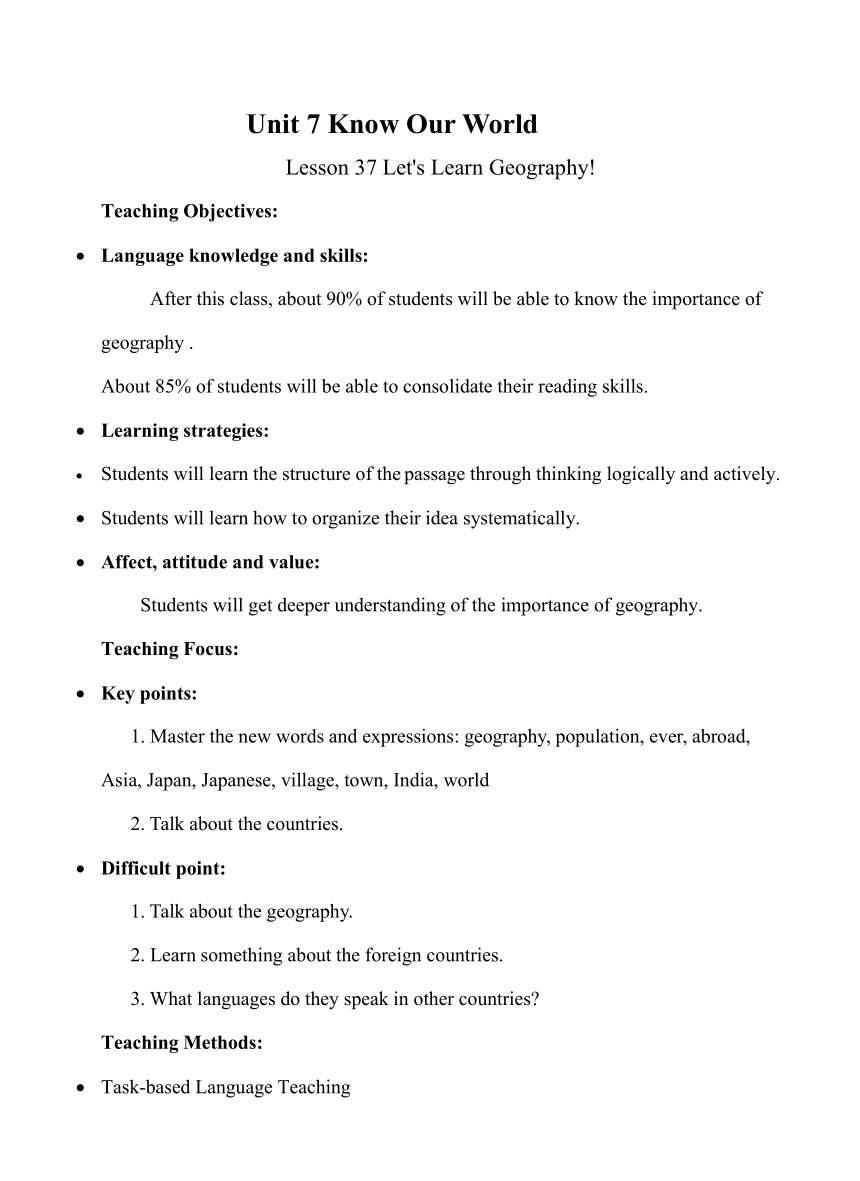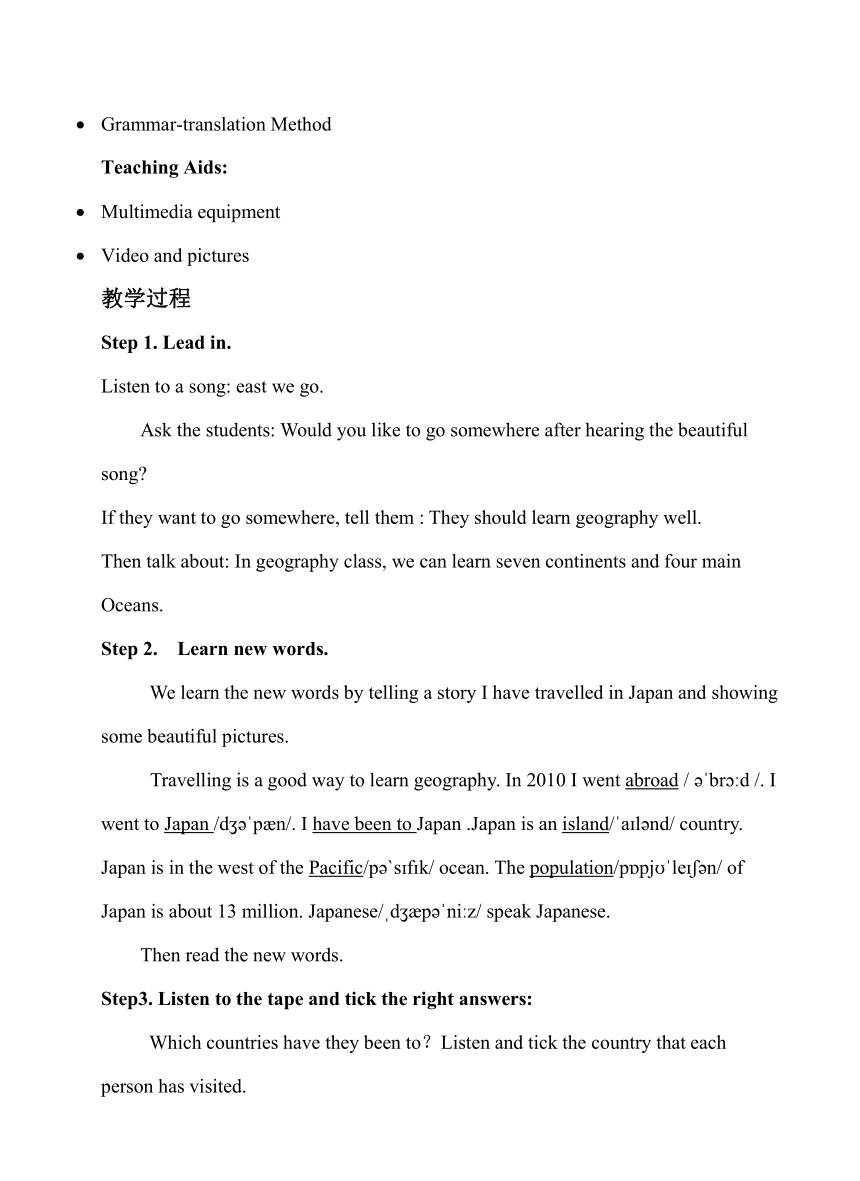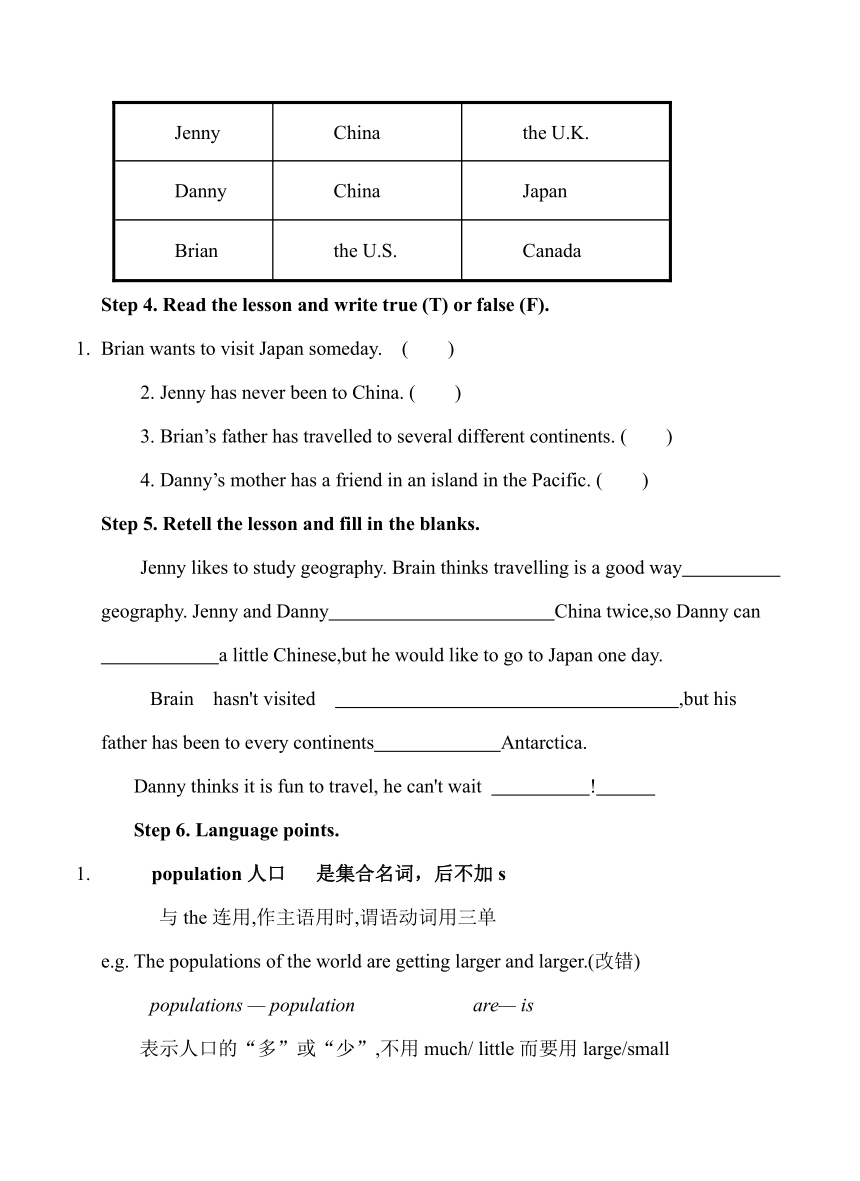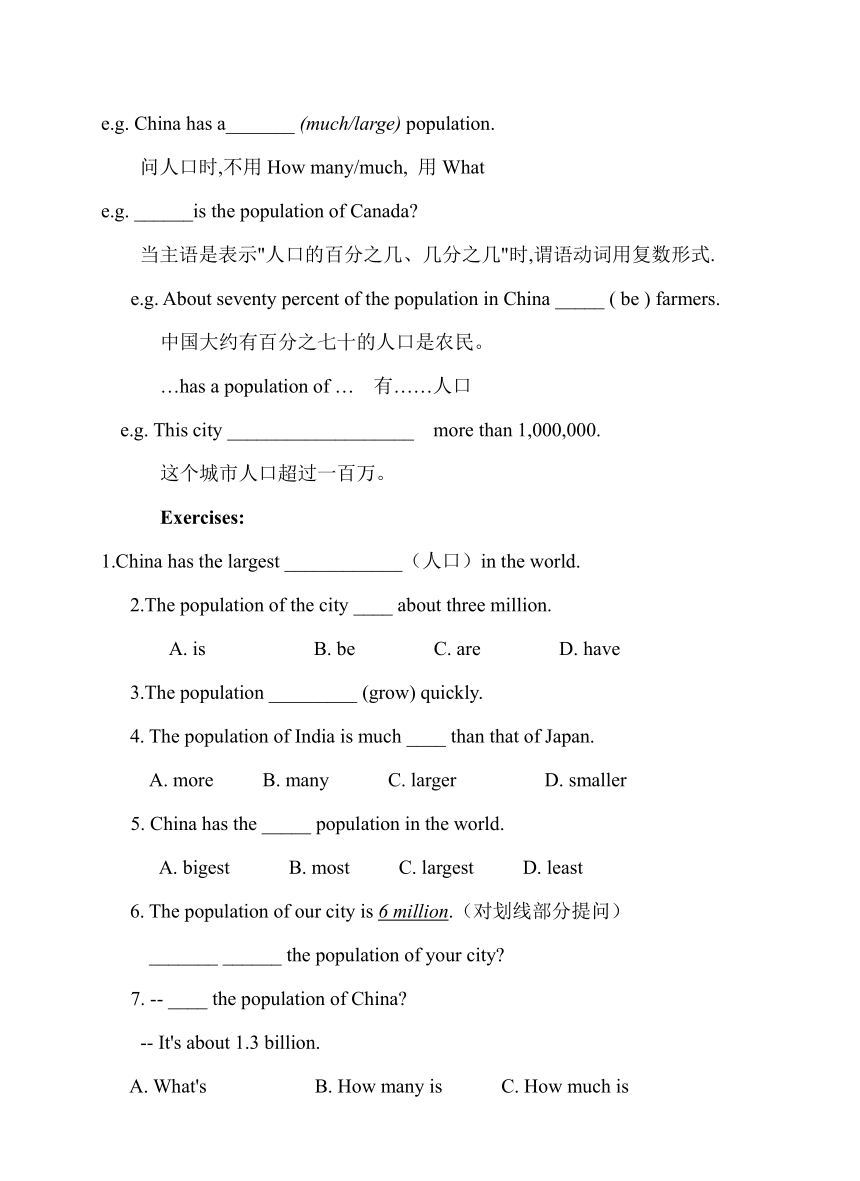冀教版八年级下册Unit 7 Know Our World Lesson 37教案
文档属性
| 名称 | 冀教版八年级下册Unit 7 Know Our World Lesson 37教案 |

|
|
| 格式 | doc | ||
| 文件大小 | 65.5KB | ||
| 资源类型 | 教案 | ||
| 版本资源 | 冀教版 | ||
| 科目 | 英语 | ||
| 更新时间 | 2023-02-25 00:00:00 | ||
图片预览




文档简介
Unit 7 Know Our World
Lesson 37 Let's Learn Geography!
Teaching Objectives:
* Language knowledge and skills:
After this class, about 90% of students will be able to know the importance of geography .
About 85% of students will be able to consolidate their reading skills.
* Learning strategies:
* Students will learn the structure of the passage through thinking logically and actively.
* Students will learn how to organize their idea systematically.
* Affect, attitude and value:
Students will get deeper understanding of the importance of geography.
Teaching Focus:
* Key points:
1. Master the new words and expressions: geography, population, ever, abroad, Asia, Japan, Japanese, village, town, India, world
2. Talk about the countries.
* Difficult point:
1. Talk about the geography.
2. Learn something about the foreign countries.
3. What languages do they speak in other countries
Teaching Methods:
* Task-based Language Teaching
* Grammar-translation Method
Teaching Aids:
* Multimedia equipment
* Video and pictures
教学过程
Step 1. Lead in.
Listen to a song: east we go.
Ask the students: Would you like to go somewhere after hearing the beautiful song
If they want to go somewhere, tell them : They should learn geography well.
Then talk about: In geography class, we can learn seven continents and four main Oceans.
Step 2. Learn new words.
We learn the new words by telling a story I have travelled in Japan and showing some beautiful pictures.
Travelling is a good way to learn geography. In 2010 I went abroad / br d /. I went to Japan /d p n/. I have been to Japan .Japan is an island/ a l nd/ country. Japan is in the west of the Pacific/p ˋs f k/ ocean. The population/p pj le n/ of Japan is about 13 million. Japanese/ d p ni z/ speak Japanese.
Then read the new words.
Step3. Listen to the tape and tick the right answers:
Which countries have they been to?Listen and tick the country that each person has visited.
Jenny China the U.K.
Danny China Japan
Brian the U.S. Canada
Step 4. Read the lesson and write true (T) or false (F).
1. Brian wants to visit Japan someday. ( )
2. Jenny has never been to China. ( )
3. Brian’s father has travelled to several different continents. ( )
4. Danny’s mother has a friend in an island in the Pacific. ( )
Step 5. Retell the lesson and fill in the blanks.
Jenny likes to study geography. Brain thinks travelling is a good way geography. Jenny and Danny China twice,so Danny can
a little Chinese,but he would like to go to Japan one day.
Brain hasn't visited ,but his father has been to every continents Antarctica.
Danny thinks it is fun to travel, he can't wait !
Step 6. Language points.
1. population人口 是集合名词,后不加s
与the连用,作主语用时,谓语动词用三单
e.g. The populations of the world are getting larger and larger.(改错)
populations — population are— is
表示人口的“多”或“少”,不用much/ little而要用large/small
e.g. China has a_______ (much/large) population.
问人口时,不用How many/much, 用What
e.g. ______is the population of Canada
当主语是表示"人口的百分之几、几分之几"时,谓语动词用复数形式.
e.g. About seventy percent of the population in China _____ ( be ) farmers.
中国大约有百分之七十的人口是农民。
…has a population of … 有……人口
e.g. This city ___________________ more than 1,000,000.
这个城市人口超过一百万。
Exercises:
1.China has the largest ____________(人口)in the world.
2.The population of the city ____ about three million.
A. is B. be C. are D. have
3.The population _________ (grow) quickly.
4. The population of India is much ____ than that of Japan.
A. more B. many C. larger D. smaller
5. China has the _____ population in the world.
A. bigest B. most C. largest D. least
6. The population of our city is 6 million.(对划线部分提问)
_______ ______ the population of your city
7. -- ____ the population of China
-- It's about 1.3 billion.
A. What's B. How many is C. How much is
8. --Which city has___population, Shanghai, Hong kong or Qingdao
A. the smaller B. the least C. the most D. the largest
2.have gone to去了某地
说话时该人不在现场,一般不用第一人称、第二人称代词作句子的主语。
have been to曾经去过某地,现在已不在那里了
e.g. —Where is Jim?
—He______ _______ _____ England.
have been in 在某地呆了多少时间
e.g. I ______________Shanghai for three years.
1. I ______ _____ ____ Beijing many times.
2. Mr. Wang isn't here. He _____ ______ _____ Qingdao.
3. Tom’s father____ to the USA before.
A. went B. goes C. has gone D. has been
4. His father went to Taiwan last month. He didn’t return yet.(合并成一句话)
His father ______ ______ to Taiwan.
1. 我爸爸去过大连三次。
My dad ____ _____ ____ Dalian three times.
2. 怀特一家人不在家。他们去公园了。
The Whites aren’t at home. They _____ _____ _____ the park.
3. 我已经去过北京动物园好多次了。
I _____ _____ _____ Beijing Zoo several times.
3.can't wait to do sth.迫不及待地做某事
e.g. I can’t waiting to seeing my new bike.(改错)
waiting— wait seeing— see
我等不及去看电视
e.g. I can't wait to watch TV
It’s fun to travel. I can’t wait ________ (go).
Have you ever been abroad, Danny
abroad adv. 在国外
e.g. She worked abroad for a year.
He was famous, both at home and_______. 他享誉国内外。
be abroad _______ go abroad _______
他去国外了.____________________
他去过国外两次了.______________________
Exercises:
I. Fill in the blanks with the words in this lesson. The first letter is given.
1. A: Which country has the largest p____________ B: China, of course.
2. A: Is Taiwan an i_________ B: Yes. It is in the Pacific.
3. A: I like all fruits e________ bananas.
B: Really I don’t like them, either.
4. Mr. Wang has gone a_________, so I won’t see him this week.
5. The people in Japan speak J__________.
II. Fill in the blanks.
1) Recently, we ____ _______ about the population of the world.
2) ____ ____ ____ ____ abroad, Danny
3) Jenny and I _____ ____ ___ China twice.
4) _____ you ____ to any other countries in Asia
5) _____ you ______ any other countries
6) He ____ _____ ___ every continent except Antarctica.
7) She ____ ____ ____ visit her friend.
III. Table Quiz!
1.The population of the world ___ (be) getting larger and larger.
2.China is a country with a ______ (多) population.
3.Japan is a country with a _____(少) population.
4.My hometown is a small city _____ a population of three million.
5.What’s the population ___ Beijing
IV. choice
1.____ the population of China
A. How many B. How much C. What’s D. What’re
2. The population of the world ___ 7 billion in 2016.
A. are B. was C. were D. has been
3. I ______ the Great Wall twice.
A. went t B. gone to C. have been to D. go to
4. Which city has ______ population, Lanzhou, Tianshui or Jia Yuguan
A. the smaller B. the least C. the most D. the largest
5.The girl can't wait her new gift .
A.open B.to open C. opening D. opens
Summary:
Read thousands of books, travel thousands of miles.
读万卷书 行万里路
Homework:
Which country or city are you most interested in Why
I have been to , it is a beautiful city/country with the population of (million/billion).
It is in the (south/north...) of the world . there are many places of interest. I can't wait to introduce them to you. I 'm most interested in .
Travelling is really a good way to (relax/enjoy) ourselves.
Reflection:
* Advantage and reasons:导入部分自然明了,直入主题,开门见山,学生对这个话题感兴趣。课堂结构安排合理,听说读写贯穿其中。课堂上学生参与度高。
* Disadvantage and reasons: 开始部分如果加入一些孩子们旅游的讨论,课堂气氛会更加活跃。
* Measures for improvement:平时从知识传授转为方法指导,科学培养学生的能力,我个人也要加强学习,不断提高业务能力,以便更好地适应新时期的教学需要。
Lesson 37 Let's Learn Geography!
Teaching Objectives:
* Language knowledge and skills:
After this class, about 90% of students will be able to know the importance of geography .
About 85% of students will be able to consolidate their reading skills.
* Learning strategies:
* Students will learn the structure of the passage through thinking logically and actively.
* Students will learn how to organize their idea systematically.
* Affect, attitude and value:
Students will get deeper understanding of the importance of geography.
Teaching Focus:
* Key points:
1. Master the new words and expressions: geography, population, ever, abroad, Asia, Japan, Japanese, village, town, India, world
2. Talk about the countries.
* Difficult point:
1. Talk about the geography.
2. Learn something about the foreign countries.
3. What languages do they speak in other countries
Teaching Methods:
* Task-based Language Teaching
* Grammar-translation Method
Teaching Aids:
* Multimedia equipment
* Video and pictures
教学过程
Step 1. Lead in.
Listen to a song: east we go.
Ask the students: Would you like to go somewhere after hearing the beautiful song
If they want to go somewhere, tell them : They should learn geography well.
Then talk about: In geography class, we can learn seven continents and four main Oceans.
Step 2. Learn new words.
We learn the new words by telling a story I have travelled in Japan and showing some beautiful pictures.
Travelling is a good way to learn geography. In 2010 I went abroad / br d /. I went to Japan /d p n/. I have been to Japan .Japan is an island/ a l nd/ country. Japan is in the west of the Pacific/p ˋs f k/ ocean. The population/p pj le n/ of Japan is about 13 million. Japanese/ d p ni z/ speak Japanese.
Then read the new words.
Step3. Listen to the tape and tick the right answers:
Which countries have they been to?Listen and tick the country that each person has visited.
Jenny China the U.K.
Danny China Japan
Brian the U.S. Canada
Step 4. Read the lesson and write true (T) or false (F).
1. Brian wants to visit Japan someday. ( )
2. Jenny has never been to China. ( )
3. Brian’s father has travelled to several different continents. ( )
4. Danny’s mother has a friend in an island in the Pacific. ( )
Step 5. Retell the lesson and fill in the blanks.
Jenny likes to study geography. Brain thinks travelling is a good way geography. Jenny and Danny China twice,so Danny can
a little Chinese,but he would like to go to Japan one day.
Brain hasn't visited ,but his father has been to every continents Antarctica.
Danny thinks it is fun to travel, he can't wait !
Step 6. Language points.
1. population人口 是集合名词,后不加s
与the连用,作主语用时,谓语动词用三单
e.g. The populations of the world are getting larger and larger.(改错)
populations — population are— is
表示人口的“多”或“少”,不用much/ little而要用large/small
e.g. China has a_______ (much/large) population.
问人口时,不用How many/much, 用What
e.g. ______is the population of Canada
当主语是表示"人口的百分之几、几分之几"时,谓语动词用复数形式.
e.g. About seventy percent of the population in China _____ ( be ) farmers.
中国大约有百分之七十的人口是农民。
…has a population of … 有……人口
e.g. This city ___________________ more than 1,000,000.
这个城市人口超过一百万。
Exercises:
1.China has the largest ____________(人口)in the world.
2.The population of the city ____ about three million.
A. is B. be C. are D. have
3.The population _________ (grow) quickly.
4. The population of India is much ____ than that of Japan.
A. more B. many C. larger D. smaller
5. China has the _____ population in the world.
A. bigest B. most C. largest D. least
6. The population of our city is 6 million.(对划线部分提问)
_______ ______ the population of your city
7. -- ____ the population of China
-- It's about 1.3 billion.
A. What's B. How many is C. How much is
8. --Which city has___population, Shanghai, Hong kong or Qingdao
A. the smaller B. the least C. the most D. the largest
2.have gone to去了某地
说话时该人不在现场,一般不用第一人称、第二人称代词作句子的主语。
have been to曾经去过某地,现在已不在那里了
e.g. —Where is Jim?
—He______ _______ _____ England.
have been in 在某地呆了多少时间
e.g. I ______________Shanghai for three years.
1. I ______ _____ ____ Beijing many times.
2. Mr. Wang isn't here. He _____ ______ _____ Qingdao.
3. Tom’s father____ to the USA before.
A. went B. goes C. has gone D. has been
4. His father went to Taiwan last month. He didn’t return yet.(合并成一句话)
His father ______ ______ to Taiwan.
1. 我爸爸去过大连三次。
My dad ____ _____ ____ Dalian three times.
2. 怀特一家人不在家。他们去公园了。
The Whites aren’t at home. They _____ _____ _____ the park.
3. 我已经去过北京动物园好多次了。
I _____ _____ _____ Beijing Zoo several times.
3.can't wait to do sth.迫不及待地做某事
e.g. I can’t waiting to seeing my new bike.(改错)
waiting— wait seeing— see
我等不及去看电视
e.g. I can't wait to watch TV
It’s fun to travel. I can’t wait ________ (go).
Have you ever been abroad, Danny
abroad adv. 在国外
e.g. She worked abroad for a year.
He was famous, both at home and_______. 他享誉国内外。
be abroad _______ go abroad _______
他去国外了.____________________
他去过国外两次了.______________________
Exercises:
I. Fill in the blanks with the words in this lesson. The first letter is given.
1. A: Which country has the largest p____________ B: China, of course.
2. A: Is Taiwan an i_________ B: Yes. It is in the Pacific.
3. A: I like all fruits e________ bananas.
B: Really I don’t like them, either.
4. Mr. Wang has gone a_________, so I won’t see him this week.
5. The people in Japan speak J__________.
II. Fill in the blanks.
1) Recently, we ____ _______ about the population of the world.
2) ____ ____ ____ ____ abroad, Danny
3) Jenny and I _____ ____ ___ China twice.
4) _____ you ____ to any other countries in Asia
5) _____ you ______ any other countries
6) He ____ _____ ___ every continent except Antarctica.
7) She ____ ____ ____ visit her friend.
III. Table Quiz!
1.The population of the world ___ (be) getting larger and larger.
2.China is a country with a ______ (多) population.
3.Japan is a country with a _____(少) population.
4.My hometown is a small city _____ a population of three million.
5.What’s the population ___ Beijing
IV. choice
1.____ the population of China
A. How many B. How much C. What’s D. What’re
2. The population of the world ___ 7 billion in 2016.
A. are B. was C. were D. has been
3. I ______ the Great Wall twice.
A. went t B. gone to C. have been to D. go to
4. Which city has ______ population, Lanzhou, Tianshui or Jia Yuguan
A. the smaller B. the least C. the most D. the largest
5.The girl can't wait her new gift .
A.open B.to open C. opening D. opens
Summary:
Read thousands of books, travel thousands of miles.
读万卷书 行万里路
Homework:
Which country or city are you most interested in Why
I have been to , it is a beautiful city/country with the population of (million/billion).
It is in the (south/north...) of the world . there are many places of interest. I can't wait to introduce them to you. I 'm most interested in .
Travelling is really a good way to (relax/enjoy) ourselves.
Reflection:
* Advantage and reasons:导入部分自然明了,直入主题,开门见山,学生对这个话题感兴趣。课堂结构安排合理,听说读写贯穿其中。课堂上学生参与度高。
* Disadvantage and reasons: 开始部分如果加入一些孩子们旅游的讨论,课堂气氛会更加活跃。
* Measures for improvement:平时从知识传授转为方法指导,科学培养学生的能力,我个人也要加强学习,不断提高业务能力,以便更好地适应新时期的教学需要。
同课章节目录
- Unit 1 Spring Is Coming
- Lesson 1 How's the weather?
- Lesson 2 It's Getting Warmer!
- Lesson 3 Sun Is Rising
- Lesson 4 The Spring City
- Lesson 5 Babysitting on a Spring Day
- Lesson 6 Stories about Spring
- Unit 2 Plant a Plant
- Lesson 7 Planting Trees
- Lesson 8 Why Are Plants Important?
- Lesson 9 Gardening with Mary
- Lesson 10 Make Your Garden Grow!
- Lesson 11 Amazing Plants
- Lesson 12 Danny's Plant
- Unit 3 Animals Are Our Friends
- Lesson 13 Danny's Big Scare
- Lesson 14 Amazing Animals
- Lesson 15 The Zoo Is Open
- Lesson 16 The Pear Escaped
- Lesson 17 Save the Tigers
- Lesson 18 Friendship Between Animals
- Unit 4 The Internet Connects Us
- Lesson 19 How Do You Use the Internet?
- Lesson 20 A Computer Helps!
- Lesson 21 Books or Computers?
- Lesson 22 Travel on the Internet
- Lesson 23 The Internet--Good or Bad?
- Lesson 24 An E-mail to Grandpa
- Unit 5 Buying and Selling
- Lesson 25 Raising Money
- Lesson 26 Cookies, Please!
- Lesson 27 Business English
- Lesson 28 Ms. Liu's Great Idea
- Lesson 29 How to Push a Product
- Lesson 30 A Cookie Sale
- Unit 6 Be a Champion!
- Lesson 31 Don't Fall, Danny
- Lesson 32 My Favourite Record
- Lesson 33 2800 Years of Sports
- Lesson 34 Modern Olympics
- Lesson 35 The Dream Team
- Lesson 36 Classroom Olympics
- Unit 7 Know Our World
- Lesson 37 Let's Learn Geography!
- Lesson 38 The World Is a Big Place
- Lesson 39 Ring Up or Call?
- Lesson 40 Body Language
- Lesson 41 A Class of the World
- Lesson 42 North America
- Unit 8 Save Our World
- Lesson 43 Let's Clean Up!
- Lesson 44 Environment Clubs
- Lesson 45 Let's Sort Garbage!
- Lesson 46 Protect Our Environment
- Lesson 47 Connected to Nature
- Lesson 48 Garbage Is Interesting!
